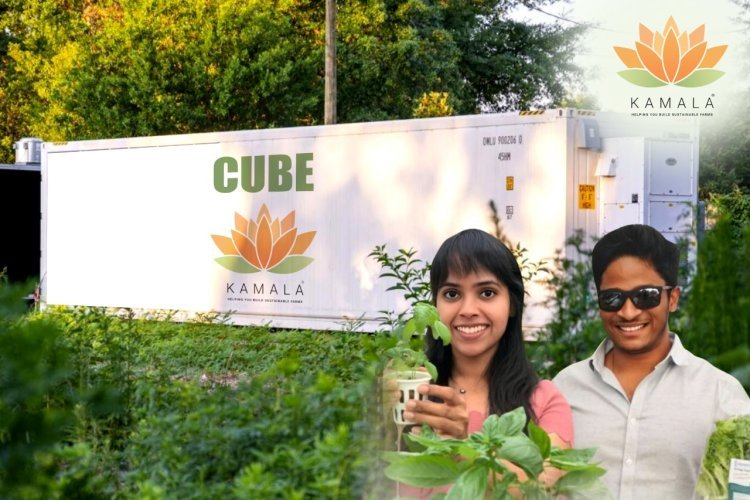Kamala Farms Leads the Future of Agriculture with America's First Large-Scale Indoor Farm
In a groundbreaking development for the agricultural industry, Kamala Farms is making history as the first enterprise to establish large-scale indoor vertical farming in the United States. This innovative approach is not just a new method of growing food; it represents a fundamental shift in agriculture, offering a multitude of benefits from environmental sustainability to economic advancement. Kamala Farms is not just cultivating crops. it's cultivating opportunities. By strategically participating in the EB-5 Visa Program, Kamala Farms is attracting significant foreign investment, spurring local job creation, and fueling economic development. The EB-5 program, which provides a pathway to U.S. residency for foreign investors who create jobs for Americans, has found a perfect partner in Kamala Farms. The farm’s expansion plans are expected to generate numerous employment opportunities.With cutting-edge technology, Kamala Farms addresses climate change and urbanization, providing fresh, locally grown produce year-round, and leading the charge in sustainable agriculture.

Redefining Agriculture with Vertical Farming
Traditional farming methods, reliant on expansive tracts of land and favorable weather conditions, have long been the backbone of food production. However, with increasing climate unpredictability and urbanization, the need for sustainable and space-efficient farming practices has never been more urgent. Enter Kamala Farms, whose indoor vertical farming model uses advanced technology to cultivate crops in stacked layers within a controlled environment.
Vertical farming stands out for its ability to maximize crop yield while minimizing land use. By growing upwards rather than outwards, Kamala Farms can produce significantly more food per square foot compared to traditional farming methods. This is a game-changer in urban settings where space is limited and the demand for fresh produce is high.
Sustainability at Its Core
Commitment to sustainability is at the heart of modern indoor vertical farming. This eco-friendly approach helps conserve vital natural resources and significantly reduces the carbon footprint. Moreover, the controlled indoor environment of Kamala Farms eliminates the dependency on seasonal changes, ensuring a consistent and reliable supply of fresh produce all year round. This method not only enhances food security but also contributes to a stable and predictable food source, less susceptible to climate-related disruptions.
Economic Growth and the EB-5 Visa Program
Kamala Farms is not only a pioneer in sustainable farming but also a catalyst for economic growth. By participating in the EB-5 Visa Program, Kamala Farms attracts foreign investment that drives local job creation and infrastructure development. This program offers a unique advantage for Indian investors, allowing them to start seeing returns from day one of the project. Additionally, it facilitates the creation of more than 10 jobs for local residents, including roles in agricultural technology and logistics.
The EB-5 Visa Program provides Indian investors with a pathway to U.S. residency while simultaneously creating meaningful employment opportunities in the community. By investing in Kamala Farms, Indian investors contribute to the farm’s expansion and benefit from a strategic entry into the U.S. market. This infusion of capital not only enhances the farm’s production capabilities and technological advancements but also positions it as a leading player in the global agricultural sector, reflecting positively on the investment's impact and return.
A Vision for the Future
The establishment of Kamala Farms marks a significant milestone in the evolution of agriculture in the USA. It exemplifies how innovation can lead to sustainable solutions that benefit both people and the planet. As Kamala Farms continues to grow, it serves as an inspiring model for future agricultural enterprises, demonstrating that the future of farming is not only bright but also green.
Kamala Farms’ approach to indoor vertical farming is particularly relevant in an era where sustainable practices are paramount. The farm’s methods address the pressing challenges of modern agriculture, such as climate change, food security, and resource conservation. By utilizing vertical farming, Kamala Farms maximizes the efficiency of land use, making it possible to grow more food in less space, which is crucial as urbanization continues to encroach on traditional farmland.
A Broader Perspective on Vertical Farming
While Kamala Farms is at the forefront of this movement, the broader implications of vertical farming are worth exploring. This method represents a paradigm shift in how we think about agriculture. In an age where sustainability is paramount, vertical farming offers a viable path
forward. It addresses key challenges such as land scarcity, water shortages, and the environmental impact of traditional farming practices.
The scalability of vertical farming also holds promise for feeding a growing global population. With urban areas expected to house nearly 70% of the world's population by 2050, the ability to produce food within city limits could alleviate pressure on rural agricultural lands and reduce the carbon footprint associated with food transportation.
Leading by Example
Kamala Farms’ pioneering efforts in indoor vertical farming have set a precedent for other agricultural enterprises to follow. The farm’s success demonstrates that it is possible to produce high-quality, sustainable food while also promoting economic growth and environmental stewardship. As more farms adopt similar practices, the agricultural landscape in the USA is poised to become more resilient and sustainable.
In conclusion, vertical farming is an exciting new way to grow food that is also good for the environment. Vertical farming can help make the future of food more safe and long-lasting by using new technologies to get around the problems with traditional farming. Kamala Farms' innovative work shows how useful this method could be and how important it is for the farming sector to keep coming up with new ideas. As time goes on, it will be very important to use these new ideas to feed a growing world population while also protecting our planet's valuable resources.


















